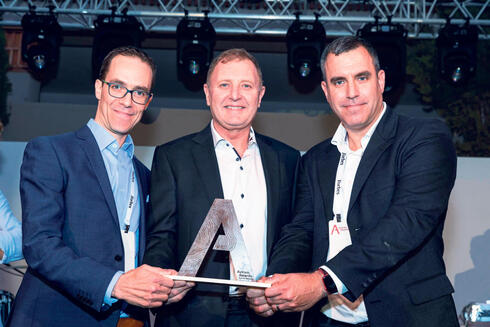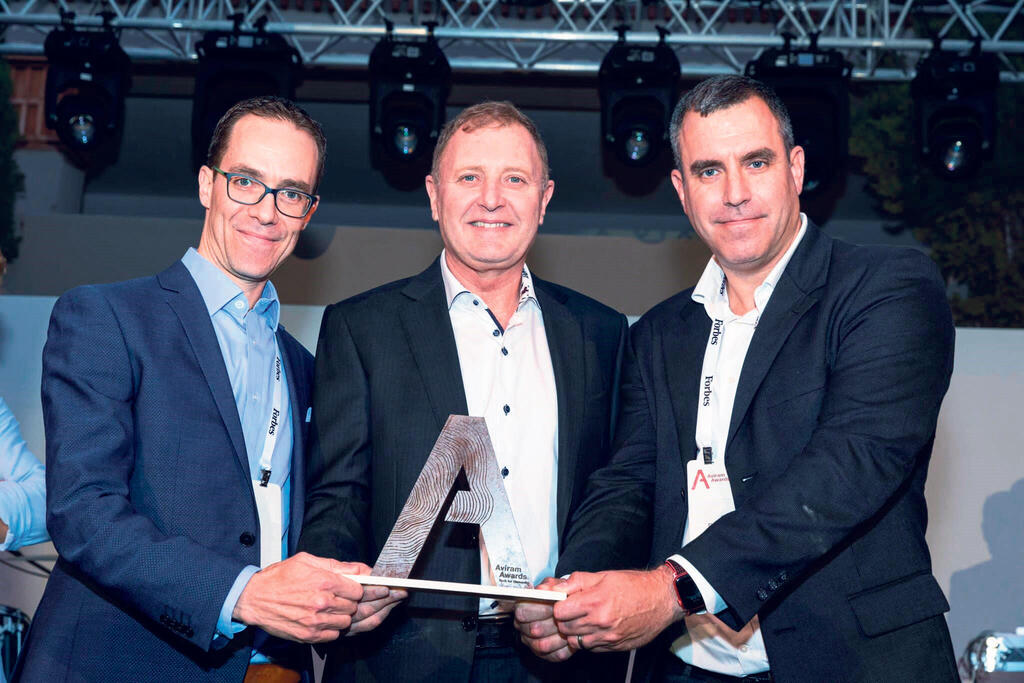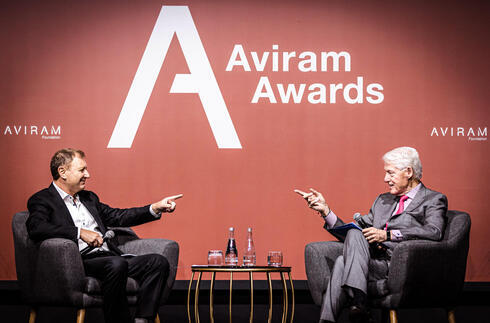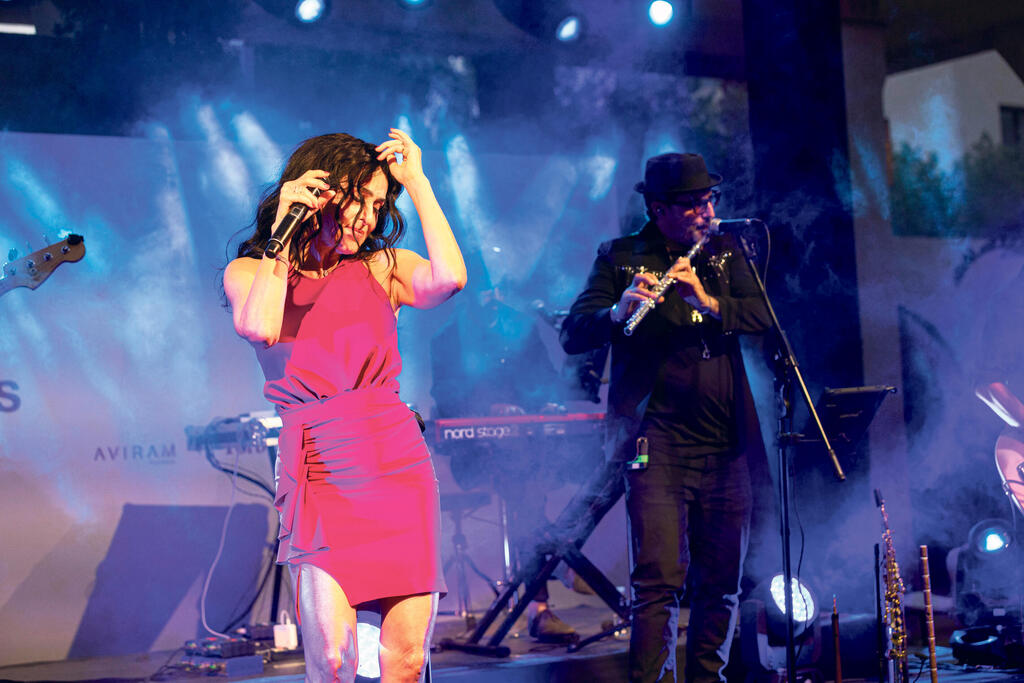
QD-SOL wins Aviram Foundation startup competition in Morocco
The Israeli company fights climate change by developing technology to produce green quantum hydrogen. Second place went to Israeli startup Carbon Blue, which removes CO2 from oceans instead of the atmosphere
Israeli startup QD-SOL is the winner of the Aviram Awards competition of the Aviram Foundation in cooperation with Forbes. The win was announced in a celebratory ceremony in Marrakesh, Morocco, in the presence of entrepreneur Ziv Aviram, former U.S. President Bill Clinton, King Hassan's adviser Andre Azoulay and local businessmen and officials.
QD-SOL, under the management of CEO Gil Davidman, is fighting climate change by developing technology to produce green quantum hydrogen. The technology utilizes solar energy to produce green hydrogen from water - without the need for electricity, making it a sustainable solution for industry and the environment. QD-SOL will receive a prize of half a million dollars, professional support from Aviram, as well as media support from Forbes.
3 View gallery


QD-SOL's Gil Davidman and Arik Ganor together with Ziv Aviram (Center).
(Photo: Forbes)
Second place was won by Israeli startup Carbon Blue, managed by CEO Dan Daviri, which is developing a solution to remove carbon dioxide using a unique method from the oceans instead of the atmosphere. Third place was awarded to Morocco’s Deepecho, which uses artificial intelligence to assist ultrasound technicians with minimal training in advanced ultrasound video diagnostics. The purpose of the company's product, headed by founder and CEO Yosef Bouyakhf, is to prevent birth defects and provide a response to premature birth.
The company that won second place was awarded a prize of $100,000, and third place was awarded a prize of $50,000.
The Aviram Awards is an annual competition organized by the Aviram Foundation in collaboration with the global magazine Forbes for startups and entrepreneurs from the Middle East and North Africa, who work to improve life through business, innovation and technology.
This year, over 780 entrepreneurs and companies from Israel, the United Arab Emirates, Bahrain, Saudi Arabia, Egypt, Morocco, Algeria, Tunisia and Jordan registered for the competition. The competition dealt with solutions that contribute to humanity in a variety of fields, including health, environment, sustainability, education, transportation, reducing gaps, and community.
The competition takes place in accordance with Aviram's vision, according to which the use of innovation and technology is a tool to change reality.
After a comprehensive examination by a team of experts as part of the competition, 15 startups were chosen to advance to the semifinal stage. As part of the semifinal event that took place online, the entrepreneurs met for the first time and received tools and training in standing in front of an audience, storytelling, and also had the opportunity to meet with international mentors, who prepared them for the finals of the competition and for their next steps in the world of entrepreneurship. Ultimately five entrepreneurs were selected to advance to the finals of the competition in Morocco.
Former U.S. President Bill Clinton also participated in the event, accompanied by senior officials from the Clinton Foundation. The former president was interviewed by Aviram about his worldview regarding philanthropic work. Clinton welcomed his foundation's partnership with the Aviram Foundation and the goals that the competition promotes, adding: "I concerned about Israel, the country I love so much. I am also concerned about the United States and the world at large. I think the ceasefire in Gaza is very important. Will it solve anything - no. Will a miracle happen here - no. But it is a positive thing that people will stop killing each other because it will allow them time to think about the future. about tomorrow."
Clinton added: "In an era when most people focus on the differences between us and not on the commonality, the Aviram Awards competition finds the common denominator between entrepreneurs and their motivation to action. The business sector must constantly ask if what it is doing is good for society, and continue to try to create an impact in a variety of areas, such as climate and education."
Aviram explained that the competition is one part of the activities of the foundation that bears his name, which is designed to promote his worldview: "I want to say two things to businesses. First, connect the business to something good. You will feel better, the employees will be more motivated, and they will give their heart. Secondly, the business sector has a responsibility towards society. It's not always clear. Not every business company thinks it wants to be responsible towards society or the country it's in as well." According to him, these values accompany him in his business career. Mobileye, for example, is a profitable company, but along the way it saves lives.
According to Aviram, the foundation decided to promote these values in a startup competition. "It's not about giving money," he said. "The prize is indeed important for startups at this stage, but it is important to explain that this is not an investment. We want to promote the idea of promoting businesses by doing good things. In addition, we want to create recognition. Let them talk about the company that won and about the finalists. The attention the companies receive because of the competition is important to them. A prize of half a million dollars, recognition, public relations, support and mentoring are a big boost for these companies."
Gili Aviram, daughter of Ziv Aviram and co-chair of the fund, explained: "Early-stage startups are asking for recognition, someone to believe in them, and that is the hardest thing to get. Such a competition can show the world that someone believes in them."
Ziv Aviram added that the criteria for choosing the winning company were "contribution to society, in health, climate and many issues. This is what the judges look at. It is a long process to judge who contributes more." However, he noted that this is not the only criterion, and that the business "should be a real profitable business."
Randall Lane, Editor-in-Chief at the international magazine Forbes, said that the purpose of the competition is "to guide and support entrepreneurs in the Middle East who drive significant social and environmental change through innovation and technology. The winner of this year's competition QD-SOL creates a lasting impact in the world, and helps solve some of the most critical issues for society."
The finalists were:
Youssef Bouyakhf, CEO and founder of Deepecho, from Morocco. The company uses artificial intelligence to assist minimally trained ultrasound technicians in advanced video ultrasound diagnostics. The purpose of its product is to prevent birth defects and to provide a response to premature birth, including low birth weight.
Dr. Hila Ben Fazi, CEO and co-founder of Avertto, from Israel. The company's goal is to save lives through innovative technologies that monitor blood flow to the brain, identify changes characteristic of large blood vessel blockages, and provide artificial intelligence-based alerts to enable rapid stroke treatment.
Dr. Noor Zaouri, CEO and co-founder of Polymeron, Saudi Arabia. The company develops and recycles environmentally friendly materials that are biodegradable and can be used as compost using organic waste from the poultry industry and the dates industry. The company offers use cases for plastic and biodegradable waste.
Dan Deviri, CEO of Carbon Blue, from Israel. The company is developing a solution for carbon dioxide removal (CDR) that includes a unique approach to removing CO2 from the world's oceans instead of from the atmosphere. The removal process is a compact and energy-efficient process with minimal maintenance.
Sharon Fima, CEO of QD-SOL, from Israel. The company fights climate change by developing green quantum hydrogen production technology. The technology utilizes solar energy to directly produce green hydrogen from water without the need for electricity, making it a sustainable solution for industry and the environment.
The international team of judges included:
Entrepreneur and businessman Ziv Aviram, founder and president of the Aviram Foundation.
Randall Lane, Editor-in-Chief of Forbes magazine.
Yassine Kaouane, Chief Entrepreneurship Director at Ben Guerir University UM6P.
Lamiae Benmakhlouf, CEO of MITC, the leading Technopark chain in Morocco.
Melda Akin, founder and CEO of D14.AI.
















